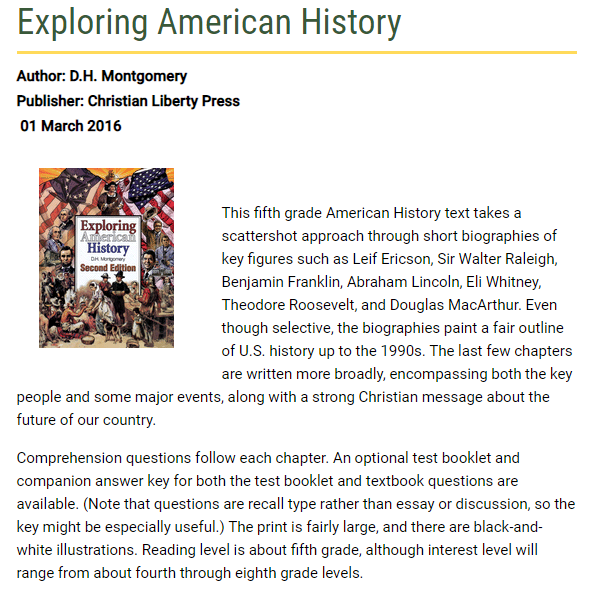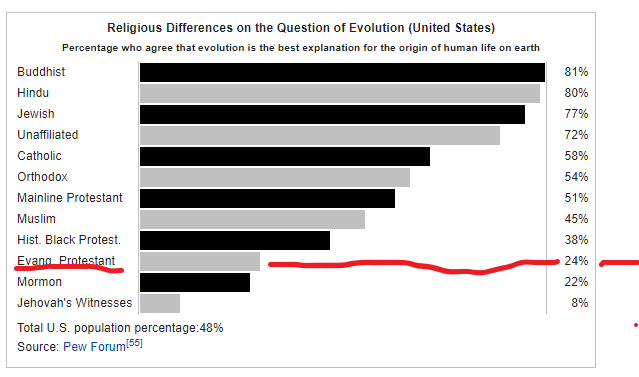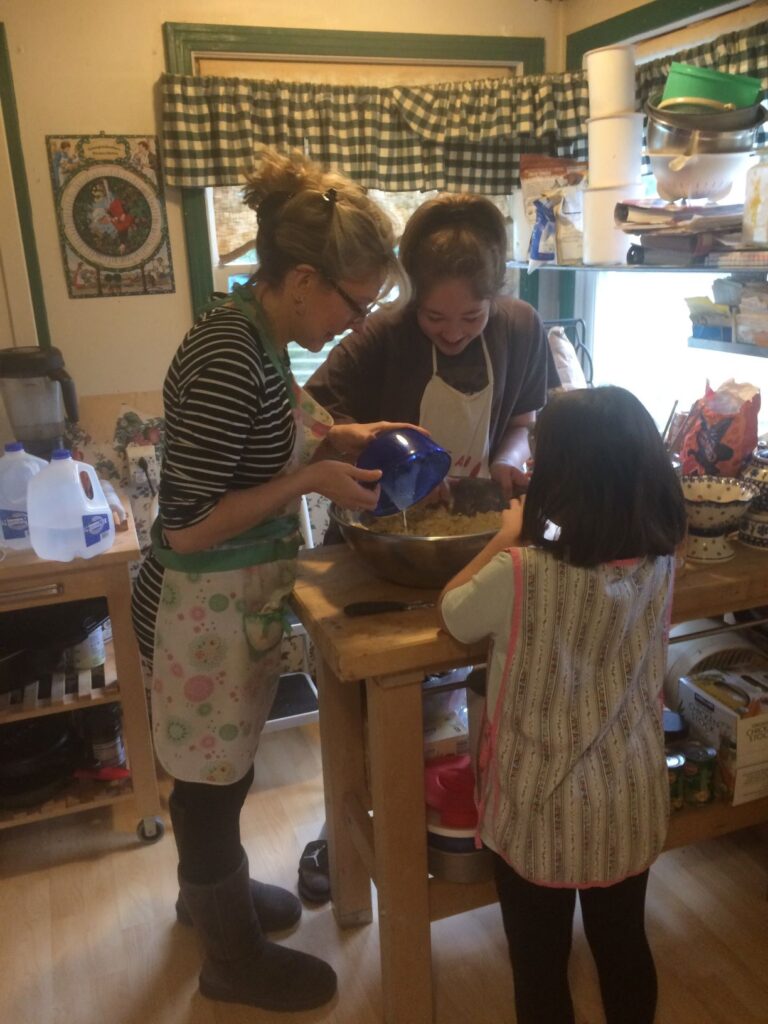Over the past 15 years of homeschooling, I can’t count the number of times we have encountered a topic, theme, or issue that has given me the opportunity for the following exposition: “This is why we homeschool. If this had come up in another setting, you wouldn’t be hearing a Biblical explanation. We wouldn’t be talking through how to view this from an eternal perspective. You wouldn’t be able to ask questions about God’s role in this, and how He might see this situation. Can you see how important this is to understanding something, gaining knowledge, wisdom, and discernment? This is why we homeschool!”

Indeed, for Christians who have taken on homeschooling with a Biblical worldview in mind, this is foundational.
We’ve brought our kids home to give them an education where God can be number one in all things, yet even veteran homeschoolers can get in a rut and need fresh ideas on incorporating God into the homeschool day.
Let’s look at the main subject areas and how a Biblical perspective can always be at the forefront!

BIBLE STUDY, PRAYER, AND BIBLE MEMORY WORK
This is the first and most obvious way of introducing God into the homeschool arena.
If you have gotten lax on this, you’re in good company. We have all been through seasons of getting to the basics and being in survival mode.
I want to encourage you that Bible study is the most basic of the basics (we think of math and language arts as being the basics, don’t we mom)! Starting the day with the Bible will always set a good tone for the day and set you up for success. And if nothing else gets done, then something with eternal value that doesn’t fade away got done, unlike the multiplication table and adjectives!
There are lots of great Bible studies out there, but all you need is a spiral notebook and a pen to get started!

S.O.A.P. is a neat way to study the Bible that kids can easily learn. You could even pair up littles and bigs so the non-writers can work with the writers.
S-Scripture
Pick out a verse or small passage for study (kids could select the verse). They write the scripture reference in the journal next to an “S”. Short passages could even be assigned to write out and could count towards copy work (more on that later).
O-Observation
Have the children write out what they notice in the verse and things that jump out at them. This could be full sentences or bullet points. Encourage them to read through several times slowly and make observations about what is happening in the passage.
A-Application
This is where the rubber meets the road, and we transfer head knowledge to our heart and apply it to our life. Train them to think about how what they read can have meaning in their life today. They can write this out using “I” and “me” words so it is very personal to them, not something for others like they are giving a sermon.
P- Prayer
Instruct the kids to craft a prayer asking the Lord to help them apply what they have learned to their life. Being open and vulnerable may be hard at first, understandably, but a humble heart before the Lord will give us rest as he is gentle and humble in heart as well.
Matthew 11:28-30 28 “Come to me, all you who are weary and burdened, and I will give you rest. 29 Take my yoke upon you and learn from me, for I am gentle and humble in heart, and you will find rest for your souls. 30 For my yoke is easy and my burden is light.”
Another easy way to approach scripture is to write a passage down, reading it carefully. Ask yourself what this teaches you about God, and what it teaches you about man. Continue with these observations and end with an application for your life and how these precepts are relevant for you right now.
Lastly, I have created a resource called, “Draw for Bible memory”, which I have on this blog. It is a fun way to memorize scripture by drawing a simple picture to represent a word or group of words in a verse.
I have posts on this with a video to guide you through the drawing process.
As fun as the drawing can be for some, it is more about having an experience with the scripture and thinking about the words, and repeating them as you go through each drawing.
They can be turned into coloring pages for preschoolers or even count as an art lesson for older kids.
Have fun with it and hide God’s word in your heart!
Below are links to the Draw for Bible memory verses I have covered so far:
Memorizing Psalm 91:3 to hide God’s word in your heart!
How to hide God’s Word in your heart (Psalm 91:2) Draw for Bible memory!
How to memorize scripture- Draw for Bible memory! (Kids love it! Psalm 91:1)
Can I draw Bible verses? (Draw Psalm 19:1-4a for memory-Part III, verse 4)
Bible verse memorization trick! (Draw Psalm 19:1-4a for memory-Part II, verse 2 & 3)
How do I memorize Bible verses? (Draw Psalm 19:1-4a for memory- Part I, verse 1)
Draw Bible verses for memorization~ (Scripture memorization made fun)

CHARACTER TRAINING
Applying Biblical precepts to our life and modeling our behavior after Christ develops character. Intentional focus on this can be helpful and there are resources available to support this, such as The Character Libraries.
I used an older version of this program when my kids were young, and their resources are now online at this link:
The Character Libraries – Expanding Your Character Understanding
SOCIAL STUDIES/HISTORY
This is an area of secular education that is prone to stray from the truth and God’s word and even a rewriting of events or an interpretation of them that supports whatever the current agenda in the world is.
There are lots of great Christian curriculums available now that tell the story of history as HIS story, not the story powerful people want to be told. Look at the table of contents and review some pages to get a feel for how history is being explained.
Check out Cathy Duffy Homeschool Curriculum Reviews (cathyduffyreviews.com) for a very comprehensive guide of over 1,000 reviews since 1982! This lady knows homeschool curriculum!
Here is an example of a review of a book we happen to have on our shelf. Some are longer but all very helpful:

I have a blog post explaining how to pick a curriculum with your child’s learning style and your homeschool method in mind. Check that out here
In a related topic, geography can be a chance to, “explore God’s creation and marvel at the varied lands on this earth”. Simple introductions like this one can frame even the most mundane lesson, and these reminders throughout can keep the flame of God’s perspective alive.
Many Bible studies lend themself nicely to geography such as Noah’s ark and where Bible scholars think it may have landed. There are some fascinating Youtube videos on this topic from scholars who debate these mysteries and can bring to life interest in the geography God created. Here is an interesting one:
(87) The REAL Noah’s Ark FOUND by Archaeologist Ron Wyatt! – Short Documentary – YouTube
SCIENCE
This subject area is by far the most prone to a secular worldview with evolution dominating the current culture’s mindset. In that sense, it is easy to spot and avoid. Unfortunately, it can sneak in when we least expect it, even in Christian curriculum.
The chart here from Wikipedia (we would do well to be skeptical of this resource, but I include it as a starting point for discovery) shows that almost one-quarter of evangelicals accept evolution, and I would not be surprised to find it is actually much higher.

This fascinating article from just two years ago reveals the high numbers of Christians who believe in evolution in some manner, depending on how the question is asked, highlighting just how important it is to have a solid footing in creation so the religion of evolution does not creep in.
How do religious Americans see evolution? Depends how they’re asked | Pew Research Center

Finding a curriculum with a strong Creationist view is essential because the whole foundation of the Bible, morality, and truth are built upon the acceptance of God as sovereign, eternal, and loving sending his son to die as our substitute. This is established in creation. If we get this wrong, the whole gospel is on shaky ground.
My girls and I have been reading an old version of this book by Ken Ham, (from Answers in Genesis), an excellent explanation of the dire need to understand creation and evolution, as a Christian.
[Answers in Genesis is an apologetics ministry, dedicated to helping Christians defend their faith and proclaim the good news of Jesus Christ effectively. We focus on providing answers to questions about the Bible—particularly the book of Genesis—regarding key issues such as creation, evolution, science, and the age of the earth.]
There is no shortage of Christian-based science unwavering in its truth. We have used Apologia science many times over the years, and it is a good starting point for solid science. Here is a list of subjects they cover:
SUBJECT
Advanced Biology (19)
Advanced Chemistry (5)
Advanced Physics (4)
Anatomy & Physiology (11)
Astronomy (10)
Astronomy High School (1)
Biology (14)
Botany (9)
Chemistry (15)
Chemistry & Physics (9)
Earth Science (5)
General Science (15)
Health & Nutrition (3)
Marine Biology (14)
Physical Science (11)
Physics (9)
Young Explorers (68)
Zoology 1 – Flying Creatures (8)
Zoology 2 – Swimming Creatures (9)
Zoology 3 – Land Animals (9
You can snoop around and peek at some of their titles with this link from Amazon:
LANGUAGE ARTS
Bible stories are terrific for a group read-a-loud, but there are lots of classics with wholesome family values.
From one of my favorites, Anne of Green Gables, to the Little House series by Laura Ingalls Wilder, and the C.S. Lewis masterpieces, you will do well to bring these into your homeschool.
You can hardly get more conservative and Christian than the sweet and nostalgic Rod and Staff Publishers materials. We used various resources from this publisher, and one of my very favorites is the early learning workbooks!
Some of the classics high schoolers might read undoubtedly have adult themes. The year 2020 prompted me to listen to the audio version of George Orwell’s 1984 so I would know what to expect next. (Just joking. Not really.)
When my high school-age daughter showed interest in this book we had a discussion. You will have to consider the content of the book and the maturity of your student carefully to discern if it is appropriate for them to consume and if the value in the work outweighs any secular themes or provides an opportunity to discuss these themes through the lens of the Bible.
MATH
Math can seem like an island of its own, unable to draw meaningful connections to the Bible, however, this isn’t true!
The order and progression we see in math is a reflection of creation where God created order out of chaos and the laws of physics that govern our world.
Math is a part of physics and created by God. It is progressive and builds on what came before it. God took six days to create the universe in an orderly progressive manner. He is consistent, and math reflects the progressive order of our Lord!
We can learn a lot about God through math if we look to see his character and values exemplified there.

Learning to tell time, for example, could lead to an exciting exploration of Genesis 1:14-19 and how the fourth day has shaped our experience of time and the world.
Even if your curriculum choice doesn’t explicitly connect math to creation, starting the school year with this explanation and frequent reminders is a good idea. It may not dull the pain of math for those who don’t enjoy working with numbers, but speaking truth into all subjects is the call of Christian educators.
Tip: Confirm any math you purchase does not have story (word) problems with inappropriate topics or ideas.
CURRENT EVENTS
The past year and a half have been fruitful in providing lots of current events to discuss within the family and consider the Biblical worldview.
From passing conversations to the entire family gathered around the living room are all ways we have processed the emerging events in a culture that is at war with itself.
I have a whole blog post about how to have a conversation and engage with others in a society where this seems to be a lost art. How to teach your children to have a conversation (with Grace and salt) and why it matters!

Even when the topic is overwhelming and confusing, discussion can be so productive. Coming together to work through challenges and going back to what we know in God’s word is comforting in these turbulent times.
It is also a great way to pivot to prayer for our nation and leaders and dig deep for verses that reveal the truth when that seems so elusive these days.
HOME ECONOMICS
The old-fashioned way of saying, “running a home”! Since God is the one who designed the family, it is a natural place to talk about serving, caring for, loving, encouraging, supporting, and forgiving others.
The home is the first place we work out the truths of the Bible in our relationships with our family.
Of course, raising children gives us lots of opportunities to work on interpersonal relationships with the heart of Jesus.

With a little ingenuity and intentionality, you can leverage some of these great opportunities.
How about focusing on service by baking some great treats for the neighbors? This is simple, can be counted toward math (measuring with fractions), home economics, and carrying out the second greatest commandment:
Matthew 22:37-40
37Jesus replied: “‘Love the Lord your God with all your heart and with all your soul and with all your mind.’[c] 38 This is the first and greatest commandment. 39 And the second is like it: ‘Love your neighbor as yourself.’[d] 40 All the Law and the Prophets hang on these two commandments.”
Art
A quick mention of a few other subject areas…
We’ve all seen art that makes us wonder…well just wonder. Art is so subjective and can have fascinating themes and visuals that work out complex human experiences.
What a great opportunity to explore God’s world visually. Drawing, painting, coloring, crafts, even playing with dough all provide tangible interaction with God’s created world and an opportunity to express our creativeness, which is a reflection of being created in his image!
There are Christian art curriculums, Youtube videos, books, and endless supplies that can inspire the production of art. I have found with my children that they naturally create and when I have tried to use art programs they suddenly “hate” art!
The formal study of art elements such as line, shape, form, space, value, etc. can be introduced when students are ready and willing to have formal instruction.
Because we were created in God’s image and he is the creator of all things, I believe we all some artistic ability in some fashion.
Let your kids just explore artistic mediums that you have available. Talk about how they are creative because God is creative. Observe the world and think about ways to interpret that visually. Look at books and videos for inspiration and marvel at what God created and all the ways we don’t even fully understand all of creation because it is so complex and infinite and a finite mind can’t take it all in.
I strongly caution that books with art can have imagery and themes that are inappropriate for students so please carefully review materials.
Consider studying a master, such as Monet (one of my favorites)! Look at his work, read about his life, immerse yourself in all things Monet, and see what your kids naturally produce with this inspiration. Does his life or art reflect a belief in God? Is God displayed in his art even if he doesn’t know it? These are fascinating questions to think about with your children.
Remember that many artists study the human body and draw or paint nudes, which can be included in the materials you may have. You get to be the judge of if/when your students are exposed to these themes.
Music
The formal study of music can be a required element of your homeschool, or one introduced when children show interest or aptitude.
This is another area that I believe showcases God’s great creativity. What music floats through your home? Classical, worship, rock?!
Lyrically music can reflect the heart of the Lord or worldly, secular, unholy, and vile ideas. Not many things get stuck in the brain as easily and quickly as a song, so it is worth considering what songs are getting stuck in the brains of your children, and if they build up righteousness or tear it down.
We love having quiet classical music in the background during school. It is calming and centering. This may be a distraction for some, or could be a flood of warm vibes for others. Again, a mention of how music relates to God’s creation and his character is always in order.
Do you play worship music in the home? This glorifies God and centers the homeschool day on his worthy traits!
You could try this before school starts, maybe 30 minutes, and see what happens when the air is filled with the joy, excitement and enthusiasm of the Lord!
Leave a comment below if you do this or try it out!

PE
God created bodies that want to move, especially growing bodies with lots of energy!
Normal backyard play is so good for kids. It doesn’t have to be a sport or a team to have value.
As you help your kids take good care of their body, play is something they direct that you can support and use as a launching pad to talk about God creating man and the amazing body we still don’t fully understand. Yet another area where God is so visible and provides so much to engage in with our children!
Sports do have so much value beyond physical training. Learning fairness, sportsmanship, integrity, and character are all essential qualities to take into adulthood and sports are a rich area to practice these biblical concepts.
Final thoughts...
As you can see, every subject area provides fertile soil to practice what the Bible teaches us and worship God almightly in everyday life.
Whether it is a curriculum that honors God or talking with our children as we go about life, we can always bring God into the picture. This is what can be lacking in other settings and great opportunities are missed when this is the case.
Pray the Lord shows you all these opportunities to talk about God in your homeschool. Don’t let the everyday mundane tasks overwhelm you so you miss the very reason you decided to homeschool in the first place!
Raising the next generation of Christ-followers is our main job. You can do this! Every morning God gives us another chance and renewed strength and support to do so!
How have you focused on the Lord in your homeschool? Leave a comment below and share your tips and techniques!
